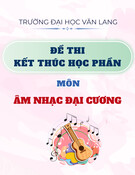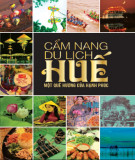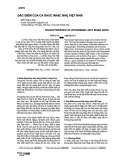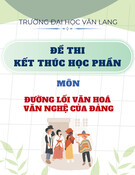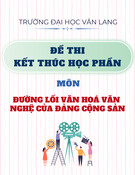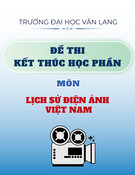
123
HNUE JOURNAL OF SCIENCE
Social Sciences 2024, Volume 69, Issue 4, pp. 123-131
This paper is available online at https://hnuejs.edu.vn/
DOI: 10.18173/2354-1067.2024-0074
BUDDHIST LOVING-KINDNESS AND COMPASSION
IN VIETNAMESE RAP MUSIC – THE CASE OF DEN VAU
Truong Thuy Chung*1 and Nguyen Diep Anh2
1Faculty of Foreign Languages, Academy of Journalism and Communication, Hanoi city, Vietnam
2Nguyen Tat Thanh Lower and Upper Secondary School,
Hanoi National University of Education, Hanoi city, Vietnam
*Corresponding author: Truong Thuy Chung, e-mail: chungndesign@gmail.com
Received November 14, 2024. Revised November 24, 2024. Accepted November 28, 2024.
Abstract. Since its introduction to Vietnam, Buddhism has been deeply intertwined with
local culture and influenced many aspects of Vietnamese spiritual life, including
contemporary art such as rap music. However, to date, there have been few academic studies
that provide important insights into contemporary Vietnamese rap as well as the influence of
Buddhism on rap. This study examined the rap lyrics of Den Vau, one of the particularly
famous rap artists in contemporary Vietnamese music. Seven rap songs were chosen
alongside a descriptive, thematic analysis was conducted. Through qualitative content
analysis, this study explores how Buddhist concepts of loving-kindness and compassion are
embedded in Den Vau's rap lyrics. The analysis reveals two main themes: (1) loving-
kindness, demonstrated through human relationships (including equal love for all people and
filial piety to parents) and environmental consciousness; and (2) compassion, manifested in
empathy for various groups (youth, parents, children, all beings) as well as self-compassion.
While previous studies often associated rap music with harmful influences, this research
indicates how rap can serve as a platform for conveying positive Buddhist values. By
examining Den Vau's rap lyrics, the study illuminates the unique fusion of Buddhist
philosophy with contemporary rap artistry in the Vietnamese context, highlighting how
global art forms can effectively transmit local values and positive messages.
Keywords: Buddhist values, loving-friendliness, compassion.
1. Introduction
Rap music, which started in the 1970s in the Bronx borough of New York City, has been
perceived as originating in inner-city African-Americans’ dreams, dilemmas, and desires. Since
then, from Shanghai to Nairobi to Sao Paulo, hip-hop in general and rap music in particular has
become popular and developed into a global art of communication [1], [2]. Rooted in the hip-
hop culture and “is the musical form that emerged from this culture” [3], rap is one of the four
major elements of hip-hop, including MC’ing or rapping, DJ’ing, B-boying or B-girling with
breaking dance styles, and graffiti art or writing [4]. As suggested by Androutsopoulos (2009),
we can view rap music as a combination of verbal art, visual representation, movement, and
sound [5]. In addition, rap carries significant features of underground music. It goes beyond
mainstream culture’s boundaries and is formed by “creative works” that used to be perceived
as being “unadulterated, free of formulaic composition, with a very hands-on and personal

Truong TC* & Nguyen DA
124
process behind it, contrasting with the mainstream’s heavy-handed production” [6]. Therefore,
rap music should be taken seriously as a cultural and artistic movement that has influenced
music culture worldwide [7] and also as a means of expressing rappers’ egos directly through
authentic lyrics [8].
In Vietnam, hip-hop and rap were influenced by North American rap culture through the
young Vietnamese generations growing up and studying in the US and Canada. Khanh Nho is
believed to have laid the first tile for Vietnamese rap music with a song called “Vietnamese Gang”
recorded in 1997 in the city of Portland, Oregon USA [9]. For the first time in the history of
Vietnamese music, a song was partially rapped in Vietnamese by a Vietnamese rapper, paving
the way for Vietnamese rap culture for Vietnamese artists. However, between 1997 and 2002,
Vietnamese rap emerged just outside of Vietnam and was mostly developed in the United States
[10]. Fans of rap in Vietnam had to wait until 2002 to witness the birth of Da Rap Club which
was established by a Vietnamese rapper called XLIM. Through the club, information relating to
rap in the world was exchanged and provided, preparing for the first underground rappers such as
Lil' Knight a.k.a. LK, and Fantasy XY a.k.a. D-Cash to appear in Vietnam [6]. Since then, rap
was no longer strange to Vietnamese music fans, especially during the 2006-2008 period, as
listeners increased in number and rap organizations were formed all over various parts of the
country, but just in the underground communities [11].
The year 2020 marked a milestone for the underground community to go mainstream as two
rap contests, namely Rap Viet and King of Rap, were aired on Vietnamese national TV during
prime time. Both shows, with the former adapted from The Rapper of Thailand and the latter
copyrighted from South Korea’s Show Me the Money, have helped a number of Vietnamese
underground rap artists achieve popularity in the mainstream music industry [12]. Almost all “big
brothers” and “big sisters” in the Vietnamese rap culture joined these two shows as coaches and
judges, including Wowy, Suboi, Karik, Binz, LK, Lil Shady, and Dat Maniac [6]. Especially, Rap
Viet with its three first episodes became the most-viewed video on YouTube's live-streaming
platform with the number of viewers reaching approximately half a million views [13].
Today, rap music is an inseparable part of Vietnam’s music culture. Numerous young
Vietnamese started as breakdancing practitioners, or b-boys/b-girls, back in 2007, then have
evolved into rappers and producers. Such outstanding faces as Binz, JustaTee, BigDaddy, Suboi,
Den Vau, ICD, and Cricket later became rap stars with independent music products and owned
tens of millions of views on digital platforms [14]. In fact, rap has become a means for Vietnamese
rappers to express themselves. Rappers rap about rebellion confronting existing customs or
conventional ideas, which shows a sign of a society in transformation [15], [14]. Through rap, rap
artists have tried to paint themselves to be young individuals having a strong desire to raise their
voice, “talk about things and connect with friends” [14], as well as show their personalities,
youthfulness, creativity, and bravery [6]. Thus, rap music has become a virtual site for Vietnamese
rappers to reflect their lived experiences and cultural values, especially in today’s digital era. Yet,
studies on contemporary Vietnamese rap music, particularly those analyzing lyrical content and
meaning, have been largely overlooked in academia.
To address this gap, this paper explores possible Buddhist values that may be reflected in
rap music through the works of Den Vau, a prominent figure in the contemporary Vietnamese
rap scene. Through thematic analysis of seven selected songs, the research examines potential
Buddhist values and cultural elements that emerge in his lyrics. The findings aim to contribute
to understanding how the rapper incorporates Vietnamese cultural elements and self-
representation in his work, potentially offering new perspectives on the localization of rap music
in Vietnamese society.

Buddhist loving-kindness and compassion in Vietnamese rap music – The case of Den Vau
125
2. Content
2.1. The Philosophy of Loving-Kindness (Metta) and Compassion (Karuna) in
Buddhism
Buddhism is a religion with a profound influence on the social life of Eastern people.
Buddhism operates in life first of all as a religion expressing human beliefs in general and Eastern
beliefs in particular. Besides, Buddhism is also an ideological doctrine whose quintessence is
Buddhist ideology - a human-oriented ideology, aimed at explaining and solving human
problems; a philosophical ideology about the laws of the universe, society, and history. Buddhism
was introduced to Vietnam in the first and second centuries and became the national religion
under the Ly and Tran dynasties in the 10th and 14th centuries. From the Le Dynasty to the
Nguyen Dynasty (i.e. the 15th to 19th centuries), although it was no longer the national religion,
Buddhism was still a religion with a strong foothold in Vietnamese social life and in Vietnamese
people’s thoughts [16].
In Buddhist philosophy, loving-kindness and compassion often go hand in hand. Along with
letting go, loving-kindness and compassion are positive and beneficial thoughts that the Buddha
encouraged each person to cultivate. According to [17], compassion and loving-kindness support
and strengthen each other. When someone has a heart filled with boundless love, they will easily
feel and understand the suffering of others deeply. From the Buddhist perspective, both
compassion and loving-kindness are unlimited states of mind, meaning that this compassion
extends infinitely and includes all living things and things.
2.1.1. Loving-Kindness (Metta)
Loving-kindness or Metta in Pali represents universal love extending to all beings, spreading
across all species. Hopkins (2001) defines loving-kindness as boundless, selfless goodwill toward
all beings [18]. This universal love motivates individuals to contribute to society, especially those
below them; to assist those less fortunate such as the elderly, children, animals, and nature; and
to avoid harming the lives of all living beings. Loving kindness manifests in speech, gestures, and
actions, with its ultimate expression found in the act of generous giving. Metta stands as one of
the four brahma viharas (sublime states, “immeasurables,” or noble abodes), alongside karuna
(compassion), mutida (empathetic joy), and upekkha (equanimity). Research suggests that
developing these states cleanses the mind, shields it from negative outcomes, and fosters
happiness [19].
2.1.2. Compassion (Karuna)
Compassion is when thinking about the suffering of others, one also feels sorrow. It is a
spontaneous, wholesome reaction, accompanied by a wish to alleviate the suffering of others [17].
In other words, compassion can be understood as a deep concern for the suffering of all living
beings, combined with the selfless desire to help others escape their suffering, even at great
personal sacrifice. A compassionate heart first helps people empathize with their parents' sorrows
for them, enables them to express words of love to their parents, and shows their love for them.
In addition to one’s parents, compassion also directs them to all other suffering sentient beings,
those in need, poverty, old age, illness, loneliness - including their enemies, so that they can
extend a helping hand [20]. Furthermore, compassionate actions are characterized by selfless
giving without expectation of reciprocity. True compassion manifests through tolerance and equal
treatment towards all beings.
2.2. The manifestation of Buddhist ideology in Den Vau's rap songs
2.2.1. Rap by Den Vau
Den Vau's real name is Nguyen Duc Cuong, born in 1989. He is one of the few Vietnamese
rap artists who achieved success through indie/underground music - a style produced

Truong TC* & Nguyen DA
126
independently from major record labels following DIY principles in recording and publishing
[21]. As an independent artist, Den Vau has maintained creative control over his music production
and distribution [22]. His lyrics often address social issues faced by young people such as the
pressures of urban life, as demonstrated in songs like This song is pretty chill [23] and The Sky
Today Is Extremely Cloudy [24]. This authentic approach to songwriting has helped Den Vau
create a strong connection with listeners who see his music as a reflection of shared experiences
and struggles.
Since 2014, Den Vau has composed and performed as lead singer on 21 singles and
collaborated with different artists on 10 other songs. Almost all of Den Vau’s rap songs are written
in Vietnamese. Sometimes only a few words or phrases in English can be found in his lyrics.
Famous rap songs by Den Vau include: Take Each Other To Hide Away, Chasing the Sun’s
Shadows, Bring money home to mom, Ten Years, Cook for You, etc. In 2023, with 16 hit music
videos reaching the top spot on YouTube Vietnam's trending chart, rapper Den Vau holds the
record for the most number-one trending videos among Vietnamese artists [25].
Through a variety of challenges and hardships, along with the Buddhist philosophy instilled
in his mind and soul, Den Vau has developed a profound outlook on life. This is shown through
his philosophical, gentle, and delicate compositions, creating a unique style in the Vietnamese rap
industry. That difference probably comes from the convergence between Buddhism and art,
between Buddhism and the artist's thinking. Buddhist philosophy deeply influences Den Vau's
compassionate nature and shapes his artistic expression of everyday thoughts and emotions. It is
Buddhist teachings that have enabled Den to infuse his rap songs with thoughtful insights about
life and humanity.
2.2.2. Expressions of loving-kindness in Den Vau's rap songs
Den Vau's loving-kindness manifests through his genuine desire to help others and bring joy
to all sentient beings. Stemming from his loving-kindness, Den Vau sincerely wants all sentient
beings and all things to live in peace and happiness, regardless of whether they are relatives or
strangers, parents or friends, children or adults, grass, trees, birds, or animals. His love seems to
cover the whole world, which is equal, impartial, and pure. This spirit of loving-kindness inspires
the rapper to contribute to society and support those in need.
Firstly, loving-kindness is manifested in actions between people, doing good deeds for
people in Den Vau's rap lyrics:
“…I cook for the children even though I'm not a great chef
It's also a way I help myself, to think less and ease my tired mind
I want to see these little guests finish all the delicious food
Because I know these children will build our homeland tomorrow
I cook for you children, so you'll have the strength to pick up each letter (each letter)”
(translation from the song Cook for You [26]).
The lyrics of the song Cook for You share Den's journey to the highlands to visit the children
“smiling coyly with round eyes” at Sa Tong ethnic minority boarding primary and secondary
schools in Muong Cha district, Dien Bien province. The rap lyrics touch the hearts of listeners
thanks to the humane message conveyed through Den Vau's meaningful actions in the midst of
treacherous mountainsides. Not only showing thoughts of loving-kindness for the young children
in mountainous regions who still struggle to secure food in the highlands, Den also acted strongly,
dedicating his strength wholeheartedly with the desire to give as much as possible. He brings
delicious meals to the children, helping them stay strong on their way to school, learn to read and
train themselves to make a breakthrough for the future of building the country.
Secondly, loving-kindness is expressed through the portrayal of a child's fidelity towards
their parents in Den Vau's lyrics. In particular, loving-kindness is present in a child's act of filial

Buddhist loving-kindness and compassion in Vietnamese rap music – The case of Den Vau
127
piety to his mother and father: “Bring money home to mom, don't bring her trouble” in Bring
money home to mom. The song's lyrics convey a message of gratitude and the desire of a child to
repay the parents who gave birth to him. In this context, “money” here is not just property, not
merely a measure of material wealth - it represents the fruit of a child's labor, a physical
manifestation of his dedication to making his parents proud, an image of maturity of the child in
his parent’s eyes.
The act of “bringing money home to mother” symbolizes a child's journey to independence,
personal growth, and ability to contribute not only to their family but to society as a whole.
“Money” here is the result of the children's efforts, through which their parents can be somewhat
assured that their children have been able to support themselves, have grown up, and are fully
grown in life. While the act of “bringing money home to mother” is precious, what's even more
valuable to a mother is her child’s assurance that he earns this money honestly and ethically: “The
money I earn doesn't need to be laundered./ It only carries the scent of sweat./ Rest assured
mother, I am a good citizen./ I pay my taxes regularly and fully.)/ …The money I earn is honest
money./ Using my strength and labor as my means.” (in the song Bring money home to mom [27]).
Thirdly, loving-kindness is demonstrated through love for nature and the act of
environmental protection. Den Vau expresses his loving-kindness through his constant efforts to
protect the environment, nurturing green trees in the future:
“Plant more trees, let's plant more trees - without forests where will music come from
Plant more trees, let's plant more trees - don't mind if our hands get dirty
Plant more trees, dear friend, join me in tilling soil and sowing seeds
So tomorrow the green forest will bring songs back to the woods...
Plant many seeds that sprout into green shoots
Making sky and earth vast with verdant hues…” (in the song Music of the Forest [28]).
The profound meaning alongside the message of environmental protection emanating from
the song's lyrics is an inspiration for listeners to take action. Den Vau directs his loving-kindness
and that of all the audience to the miserable situation of countless living beings in the jungle where
trees are cut down, destroyed, and illegally exploited. “Plant more trees” is the artist's call to
protect nature - a nationwide appeal to green the bare lands and hills across all provinces and
cities. It is a call for individuals and families to join hands in building sustainable ecosystems
throughout Vietnam, both for today and future generations. He believes that the act of planting a
seed is a simple good deed that one does not need to be great to perform this small act and that by
joining hands together, people can help nature revive, restore the forest's symphony of wildlife,
and protect all living species and their natural habitats.
To sum up, Den Vau demonstrates loving-kindness through his generous care for his family,
as well as for all living things in life. Den practices the philosophy of Buddism’s metta to the
point that the artist's so-called “self” appears to have vanished. He sees himself assimilated with
all sentient beings, therefore, there is no longer any difference between himself and others. All
things have become a unified whole through the artist's truly tolerant, vast, and equal kindness.
2.2.3. Expressions of compassion in Den Vau's rap songs
To begin with, Den Vau demonstrates compassion for the youth’s struggles. The rapper
especially writes about young people’s hardships, difficulties, and struggles in life. In his lyrics,
listeners encounter the common suffering of humans, particularly, the youth. They attempt to
make a living and deal with a variety of issues such as competition, jealousy, envy, stumbling,
slander, defamation, and contempt in their life, “…They will exhaust you for every penny./ No
matter what your Vietnamese zodiac is, they want to ride you./ Ride on your head and neck, even
if you stick out your tongue and whine./ ...Try falling once, few people are willing to help you./

